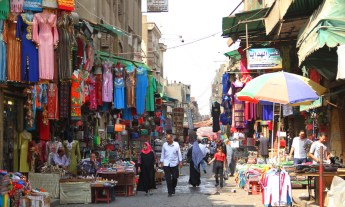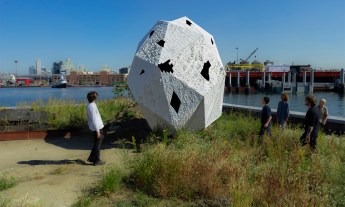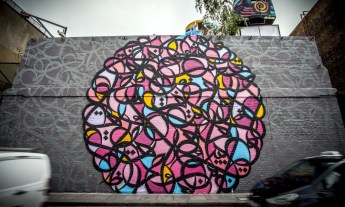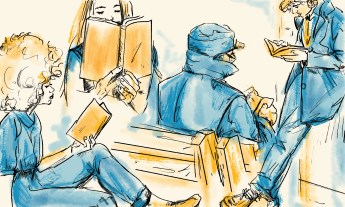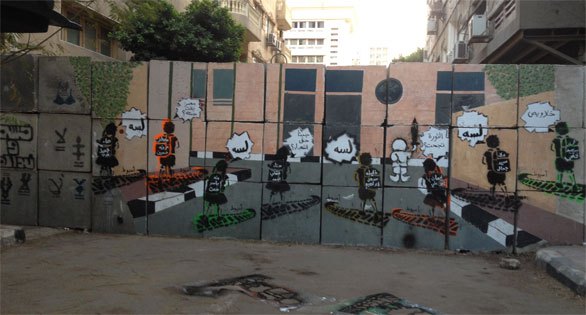
Artist, activist and historian Bahia Shehab tells Alison Prato how she speaks out against social and political injustice in her adopted city of Cairo.
Early one morning, hours before the sun was due to rise, Lebanese-Egyptian artist Bahia Shehab was alone on the streets of Cairo, spray-painting a stenciled message that spoke out against the stripping of veiled women. It’s a campaign she discussed in “A thousand times no,” her inspiring TED Talk, and it was not only a beautiful work of street art — it was also a way for Shehab to speak out against injustice.
That night, just before she’d left home, she’d packed up her backpack (“It used to be my breastfeeding backpack,” she says with a laugh) with the essentials: cans of spray paint, stencils, her keys, and a small wallet containing nothing but her ID and a bit of money. “I bring enough so that if I’m pestered I can give them money and they leave me alone.”
As she sprayed the wall, a car with black tinted windows rolled up. “Suddenly there was this guy, a snitch, who was working with the local intelligence agency, called the Mukhabarat. He drives up to me and says, ‘Why are you painting this? Who are you?’ And suddenly he wants to take me for interrogation.”
Instead of getting into the car, Shehab stood her ground. “I start arguing with him: ‘Am I doing anything wrong? I’m just spraying a campaign to tell men not to harass me on the street. Would you like this to happen to your mother? Your sister? Do you have a daughter? Would you like men harassing them on the street? It’s shameful!’ I started giving him a lesson, and finally he said, ‘Okay, okay, you can keep doing what you’re doing,’ and drove off.”
It wasn’t the first time Shehab was harassed for her brave street art (the process of creating it is risky, considering the violence that has been taking place on Cairo’s streets) and it also wasn’t the last. Another time, three civilian men chased her down. “One man took my cans and vandalized my work the minute I sprayed it, and another man tried to snatch my stencils from me.”
“Do you have a daughter? A sister? Would you like men harassing them on the street?”
“I’ve had several encounters with people who were very aggressive and brutal. I work at 4 in the morning because [regular] people are sometimes more dangerous than the police. I always make sure my stencils can be sprayed quickly and that my car is very close so I can get away.”
Shehab sprayed her first stencil in 2011, “when the military was very brutal” and the revolution had been sweeping through Cairo for nine months. Although she wasn’t in Tahrir Square at the beginning of the revolution, she was inspired by an image, which she describes in her TED Talk, of dead bodies on the street. “It was specifically that image,” she says. “All the virginity tests, the beating up, the gassing of people on the street, the sniping. I felt like I needed to go down to the street to work.”
After creating her first piece of street art, she was hooked. “It was in Tahrir, and the feeling was amazing,” she says. “I can’t describe how beautiful it was. I felt free. I felt like I was screaming. I felt like all of the stress of the whole year that had been building up, was all released through that spray can. It was very liberating.”
After creating her first piece of street art, she was hooked. “I felt free. I felt like I was screaming.”
Born and raised in Beirut, Shehab has been interested in art since she was a young girl. Her father owned a factory that manufactured heating systems, and her mother was a full-time mom, raising Shehab and her five brothers and sisters. (Only one brother remains in Beirut; the rest of her siblings are scattered around the world.) In 1999, she graduated from the American University in Beirut with a degree in graphic design, and she worked as creative director with several advertising agencies in Beirut and Dubai, where she lived for five years. Today, she is a creative director with the advertising agency Mi7-Cairo, and also a professor at the American University in Cairo, where she developed a four-year graphic design program focusing on the discipline in the Arab world.
Shehab’s husband, Tarek Montasser, also works at Mi7, which formed in 2008, and is a multi-disciplinary artist in his own right. “He’s working on his first feature film, and he’s a very good painter — and I’m not just saying that because he’s my husband.” They met while she was living in Dubai, and they have two daughters, ages 9 and 6.
When they first moved to Montasser’s native Cairo in 2004, the couple lived in the city, but the next year, they moved to the suburb called the 6th of October City, named after the day in 1973 when the Egyptian Army pushed across the Suez Canal and dislodged the Israelis who had been occupying the Sinai Peninsula since 1967. (A lot of bridges, cities and factories are named after that date, she explains.) Their home is a much-needed respite from Egypt’s capital city, the largest in the country.
“I’m living in a very quiet area,” she says. “I couldn’t live in the heart of Cairo. When I first moved here, I stayed in town for three months and it was too much — there’s so much noise. I couldn’t sleep. They won a football match and beeped their car horns until 3 in the morning. I couldn’t understand why! So I moved out of town, but what’s beautiful is that it’s very close.”
“It’s the most — I don’t want to say aggressive, but I will say difficult city to exist in. There are a lot of traffic jams. But eventually you learn how to work around it, and it grows on you.”
It’s an understatement to say that getting around Cairo on a daily basis is laborious. To deal with the traffic, Shehab uses a crowdsourcing app, Bey2ollak, which helps residents keep track of the status of all major roads. “There’s no system for us to know, otherwise,” she says. “And it’s written in a funny way, like, ‘The road is hopeless.’” The app also includes another aspect that speaks directly to Cairo’s violence: “After the revolution, they added another feature that tells you if there’s a shooting, if the roads are blocked or if there are demonstrations. People tell each other, ‘Don’t go there. It’s too dangerous now.’” Users can also crowdsource convoys, because cars, especially ones being driven alone, are sometimes stolen by armed men. “I might say, ‘I’m leaving for Marina, and I need three cars to move with me.’ It’s safer that way.”
Drivers often crowdsource convoys through an app — because cars, especially ones being driven alone, are sometimes stolen by armed men.
Military checkpoints have become a fact of everyday life, as is a curfew that restricts people from being outside after midnight on weeknights and after 7 p.m. on Fridays. “They’re very brutal,” she says. “They ask for your papers, and they can make you wait for hours, and if they suspect something, they can take you into custody.”
“Men don’t feel [the danger on the streets],” she continues. “Even my husband sometimes does not believe how bad it is. And I fear for my two daughters. I wouldn’t like them to be on the street in a country that is so aggressive towards women. Muslims who were trying to take over politically started planting the idea that if a woman was covered, then she was chaste and she wouldn’t be harassed. And so women started covering and covering until they were wearing black tents with nothing but their eyes showing. But they were still getting harassed!”
The derogatory term, often used on the streets of Cairo, is “awra,” and Shehab has been hearing it since she was a young girl. “If I wear a sleeveless shirt, men pinch me and say abusive statements, that I’m a whore or a bitch or I should be covered up. But it’s not my body that should be covered. It’s your brain that’s [messed] up.”
The curfew has taken a toll on her painting; since she usually works so early in the morning, she hasn’t been out since June. “It’s because of the military, but also because I feel like I need to be quiet right now. I need to wait and see what’s going to happen. I don’t want to condemn the military or the new government before I see what they do next.”
So would she ever move out of Cairo? The short answer is no. “My daughters belong here. They are both Egyptians, and I would like them to grow up in their own country, to learn their own language and have a sense of identity and belonging.”
Plus, she says, the revolution is far from over. “In the near future, I hope we can all agree on a solid constitution so we can build our rights on it. I hope we can elect a good party — people who are not thieves, murderers, capitalist bastards or religious freaks. I hope we can find somebody who really cares and loves this country as much as we do, and who hopes to genuinely improve it.”
She’s feeling optimistic. “Give us time. Things don’t happen overnight. When I was at a conference earlier this year in Berlin, a man said to me, ‘So how do you feel now that your revolution failed?’ And I was like, ‘Excuse me? We haven’t even started, sir.’”
Check out all of Shehab’s favorite places in Cairo in this handy annotated map. To see pictures, see this gallery of photographs shot by Ohoud Saad. This article was published as part of our “Questions Worth Asking” series. This week’s teaser: “What makes a city feel like home?”
Alison Prato is a regular contributor to TED.

















